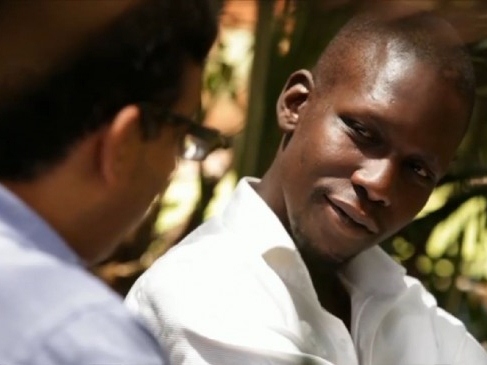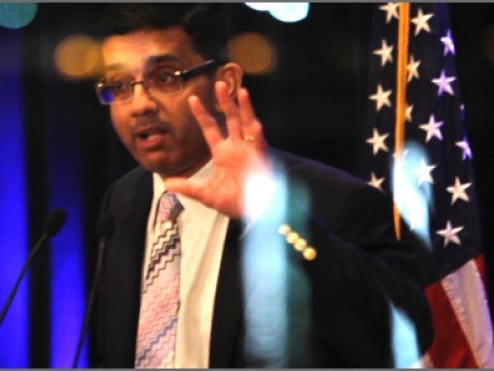Was it fair for Dinesh D’Souza to call President Obama a “hypocrite?” It seems Obama has repeatedly refused to aid his impoverished, slum-dwelling half-brother George–even with emergency medical care for his son, the president’s nephew.
As D’Souza wrote in a Fox News editorial last week:
A few days ago I received a call from a man I recently met named George. He was a bit flustered, and soon informed me that his young son was sick with a chest condition. He pleaded with me to send him $1,000 to cover the medical bills. Since George was at the hospital I asked him to let me speak to a nurse, and she confirmed that George’s son was indeed ill. So I agreed to send George the money through Western Union. He was profusely grateful. But before I hung up I asked George, “Why are you coming to me?” He said, “I have no one else to ask.” Then he said something that astounded me, “Dinesh, you are like a brother to me.”
Actually, George has a real life brother who just happens to be the president of the United States. (George Obama is the youngest of eight children sired by Barack Obama Sr.) George’s brother is a multimillionaire and the most powerful man in the world. Moreover, George’s brother has framed his re-election campaign around the “fair share” theme that we owe obligations to those who are less fortunate.
One of Obama’s favorite phrases comes right out of the Bible: “We are our brother’s keeper.” Yet he has not contributed a penny to help his own brother. And evidently George does not believe, even in times of emergency, that he can turn to his brother in the White House for help….Obama also has an aunt named Hawa Auma, his father’s sister, who ekes out a living selling coal on the streets of a small village in Kenya. She says she would like to have her teeth fixed, but she cannot afford it. Obama hasn’t offered to help her either.
D’Souza goes on to assert:
George’s tragic situation exposes President Obama as a hypocrite. Here is a man who demands that others pay higher taxes to help the poor–even poor people who are not related to them–while Obama himself refuses to help a close relative like George.
Those who viscerally hate the president might suggest that Barack Obama, Jr., is re-enacting one of his “dreams from my father,” since Barack Obama, Sr., also failed to provide support for his (multiple) wives and many children–leaving their upkeep to the tender mercies of the public welfare system in Kenya and the kindness of stepfathers.
Is the president simply re-enacting the callous behavior of the father he idolized for decades from afar? D’Souza has another view, suggesting the president disdains his brother George for his comparatively conservative views.
Just so, Barack and his mother once loathed the pro-market, pro-Western values of Obama’s stepfather, Lolo, who supported them both throughout his childhood in Indonesia. (This ideological conflict in Obama’s family is amply documented in D’Souza’s fascinating, fair-minded documentary “2016: Obama’s America,” which is now breaking box office records.)

Neither explanation feels quite right or entirely fair. What if President Obama is being neither callous nor vindictive, but simply consistent? One thing D’Souza does establish in his thoroughly documented film is that Barack Obama’s political career has been shaped since early childhood by a very distinct ideology: Post-colonial, big-state, anti-market socialism, of the sort that Barack, Sr. was working to establish in Kenya.
This political philosophy makes solid, specific claims about the world–claims Barack Obama learned well from his leftist professors at Columbia, including the fulminating anti-Westerner and anti-Zionist Edward Said. Let’s list them, as young Barack no doubt did when he took notes back in college:
Poverty in the developing world is the direct or indirect result of exploitative actions and biased institutions imposed by wealthy foreigners and their allies; Domestic poverty in advanced nations like ours is the fault of racism, capitalism, and the power of elites who must be dispossessed. (This is the “change” Obama “believes in.”) This “change” can come about via outright revolution, as Obama mentors Frank Marshall Davis, Jeremiah Wright and Bill Ayers argued.
When direct revolutionary action is impossible, “change” can be achieved gradually, by “community organizing,” (Saul Alinsky) and infiltrating “mainstream” institutions (Antonio Gramsci). Private charity (whether from family, friends, or churches) is “objectively” counter-revolutionary, placing Band-Aids on gaping wounds and thereby removing some of the grievances that should drive the oppressed classes to rise up and take power.
This is not a vulgar, thoughtless position. It is one held by thousands of tenured academics at elite institutions worldwide. It accords with the platforms of European socialist parties–which may explain Obama’s wild popularity abroad. This political philosophy is, however, deeply incompatible with the core values of most Americans and with our market democracy.
That is why candidate Obama did his best to disguise his views and distance himself from his old allies while he was running–and why D’Souza has done such a service to voters by connecting the ideological dots.
Accept this worldview, and you might very well think that helping your brother get out of a Kenyan slum is morally wrong: You are really helping the landlords, sweatshop owners and foreign exploiters to get away with their ongoing, chronic theft of the people’s wealth.
By cleaning up one of his messes, you are letting “the Man” off the hook. Like a misguided spouse who makes excuses for an alcoholic spouse, you are engaged in what psychologists call “enabling.”
Since we don’t think the president is, in fact, a cold-hearted monster, we strongly suspect that his motivations for neglecting his close blood relatives were principled and political. He didn’t want to be “part of the problem;” instead, by redistributing wealth between rich citizens and poor ones, and rich nations and poor ones, President Obama thinks he is “part of the solution.”
We could not if we were writing a political novel come up with a starker contrast to this philosophy than the views of Rep. Paul Ryan–a man who outgrew his youthful attraction to radical individualist Ayn Rand, but took away from her novels their only lesson: a deep, aesthetic disgust for collectivism such as the president’s. His Catholic faith, in fact, has demanded that Ryan accept the principle that popes have called “solidarity,” the fact that as human beings we are all in this mess together, that the right of private property must be counterbalanced by the fact that God created the earth for all of us, and everyone (however poor) has the right not to starve in the streets.
But Ryan learned another principle from the Church’s 2,000-year tradition of serious moral reflection, one that churchmen call “subsidiarity.” It was summed up very nicely by Bishop Morlino, who came to Ryan’s defense when the congressman was attacked by a raft of Catholic academics who have signed on to the president’s post-colonial socialism.
As the bishop wrote:
[T]he time-tested best way for assisting our neighbors throughout the world should follow the principle of subsidiarity. That means the problem at hand should be addressed at the lowest level possible — that is, the level closest to the people in need. That again, is simply the law of human reason.
It seems to stand to reason that if you are a multimillionaire, you would help your brother get medical care. Likewise, that churches, private agencies, and local governments should first try to solve the problems that they face with the means at hand–rather than wait for a distant federal government to reshuffle wealth (with enormous waste).
We are first responsible for ourselves, and then for our family members, then for our actual neighbors, and so on up the ladder. Barring an obvious evil such as slavery or discriminatory laws that prevent people from succeeding, one should not place the blame for poverty and dysfunction on distant actors–nor weave conspiracy theories to explain why children of broken homes, whose parents use drugs or have dropped out of school, are less prosperous than others.
It frustrates our American impulse to “fix” things quickly and simply to say that some social problems are deeply rooted and must be solved from the ground up. This impatience drives some extreme pundits to come up with racist theories that dismiss minorities as incapable of achievement.
Happily, no such cranks seem likely to thrive in American politics. If only their counterparts on the dead-end Marxist left were equally marginalized, we might be able to cross the partisan divide and find real solutions for our fellow citizens who live in poverty.
Ryan’s approach is much more thoroughly grounded in our culture, and it better accords with human nature and the facts. Let us hope it prevails.

COMMENTS
Please let us know if you're having issues with commenting.